Forensic Mental Health Recovery Process: Sociocultural Aspects
VerifiedAdded on 2022/10/04
|22
|6541
|38
Report
AI Summary
This report delves into the mental health recovery process, particularly within forensic settings, emphasizing its evolution, sociocultural aspects, and the influence of the consumer movement. It begins with an introduction to the topic, highlighting the shift towards patient-centered care and the impact of biomedical advancements. The background section traces the historical context of mental health treatment, the emergence of psychiatry, and the development of psychotropic medications. The report then explores the personal recovery process, emphasizing its holistic and individualized nature. The literature review section focuses on forensic mental health recovery from a sociocultural perspective, using the CHIME framework (Connectedness, Hope, Identity, Meaning, Empowerment). The report discusses the New Zealand Mental Health Commission's role in shaping mental health policies and the application of recovery-oriented assessment tools. It concludes by summarizing the key findings and the importance of a sociocultural approach to forensic mental health recovery, advocating for patient empowerment and integrated care.
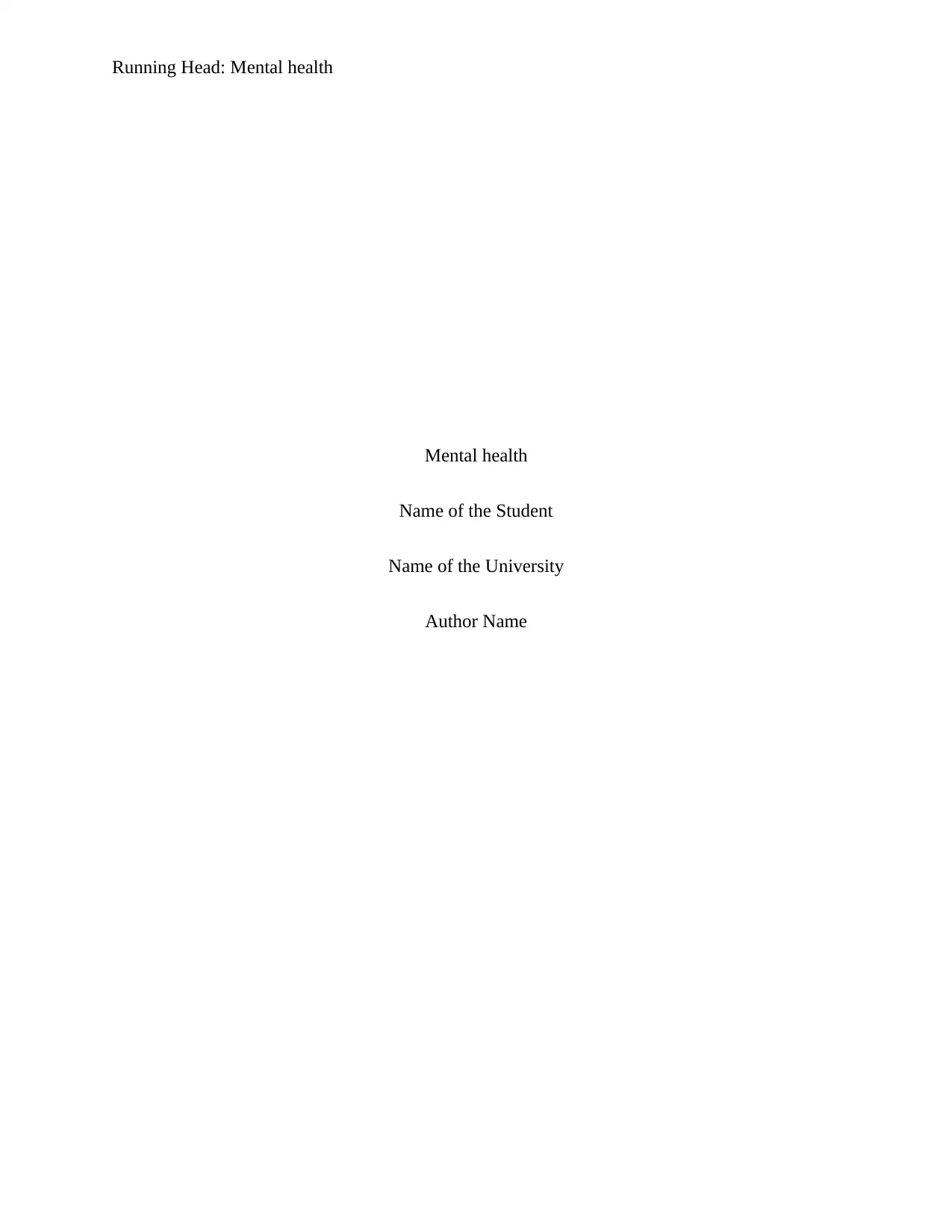
Running Head: Mental health
Mental health
Name of the Student
Name of the University
Author Name
Mental health
Name of the Student
Name of the University
Author Name
Paraphrase This Document
Need a fresh take? Get an instant paraphrase of this document with our AI Paraphraser
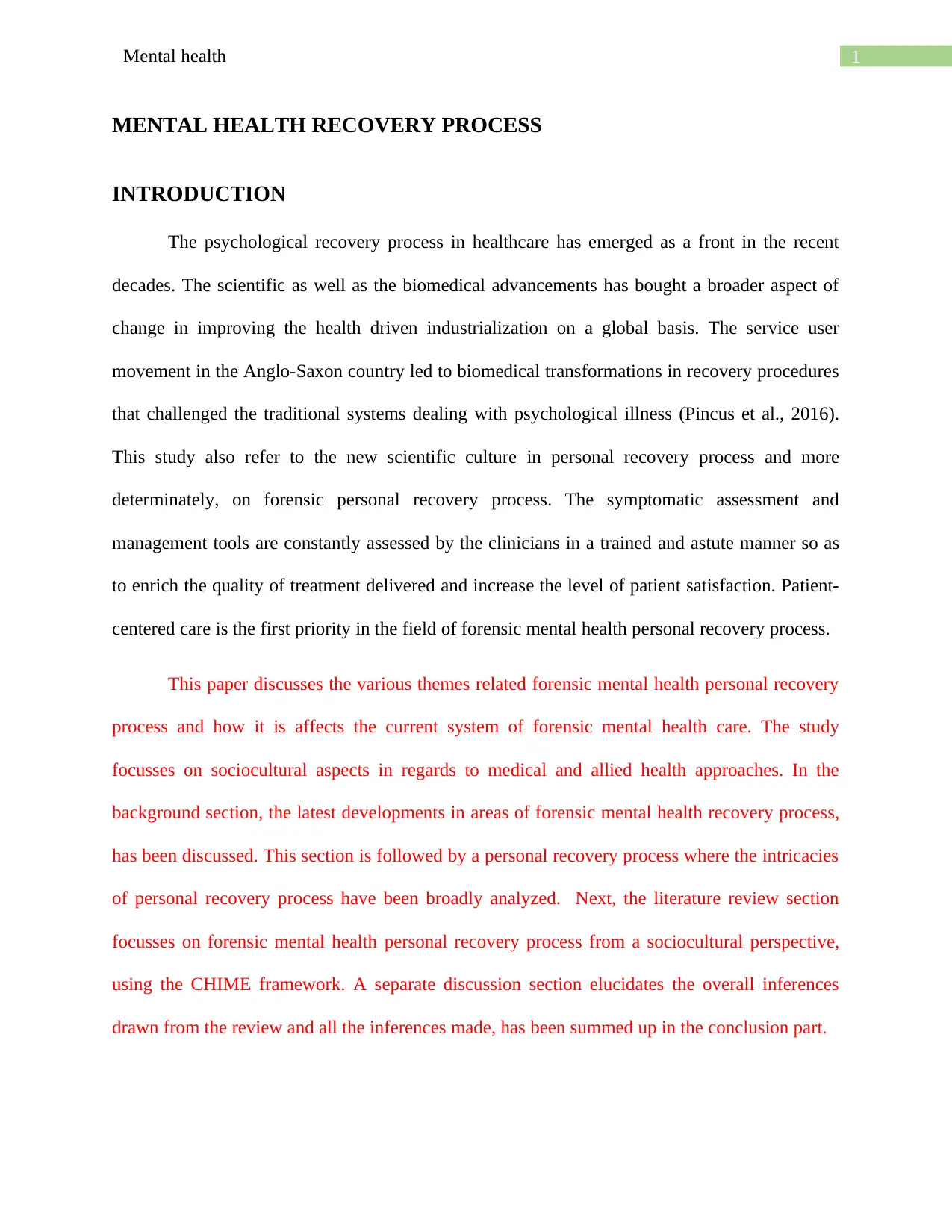
1Mental health
MENTAL HEALTH RECOVERY PROCESS
INTRODUCTION
The psychological recovery process in healthcare has emerged as a front in the recent
decades. The scientific as well as the biomedical advancements has bought a broader aspect of
change in improving the health driven industrialization on a global basis. The service user
movement in the Anglo-Saxon country led to biomedical transformations in recovery procedures
that challenged the traditional systems dealing with psychological illness (Pincus et al., 2016).
This study also refer to the new scientific culture in personal recovery process and more
determinately, on forensic personal recovery process. The symptomatic assessment and
management tools are constantly assessed by the clinicians in a trained and astute manner so as
to enrich the quality of treatment delivered and increase the level of patient satisfaction. Patient-
centered care is the first priority in the field of forensic mental health personal recovery process.
This paper discusses the various themes related forensic mental health personal recovery
process and how it is affects the current system of forensic mental health care. The study
focusses on sociocultural aspects in regards to medical and allied health approaches. In the
background section, the latest developments in areas of forensic mental health recovery process,
has been discussed. This section is followed by a personal recovery process where the intricacies
of personal recovery process have been broadly analyzed. Next, the literature review section
focusses on forensic mental health personal recovery process from a sociocultural perspective,
using the CHIME framework. A separate discussion section elucidates the overall inferences
drawn from the review and all the inferences made, has been summed up in the conclusion part.
MENTAL HEALTH RECOVERY PROCESS
INTRODUCTION
The psychological recovery process in healthcare has emerged as a front in the recent
decades. The scientific as well as the biomedical advancements has bought a broader aspect of
change in improving the health driven industrialization on a global basis. The service user
movement in the Anglo-Saxon country led to biomedical transformations in recovery procedures
that challenged the traditional systems dealing with psychological illness (Pincus et al., 2016).
This study also refer to the new scientific culture in personal recovery process and more
determinately, on forensic personal recovery process. The symptomatic assessment and
management tools are constantly assessed by the clinicians in a trained and astute manner so as
to enrich the quality of treatment delivered and increase the level of patient satisfaction. Patient-
centered care is the first priority in the field of forensic mental health personal recovery process.
This paper discusses the various themes related forensic mental health personal recovery
process and how it is affects the current system of forensic mental health care. The study
focusses on sociocultural aspects in regards to medical and allied health approaches. In the
background section, the latest developments in areas of forensic mental health recovery process,
has been discussed. This section is followed by a personal recovery process where the intricacies
of personal recovery process have been broadly analyzed. Next, the literature review section
focusses on forensic mental health personal recovery process from a sociocultural perspective,
using the CHIME framework. A separate discussion section elucidates the overall inferences
drawn from the review and all the inferences made, has been summed up in the conclusion part.
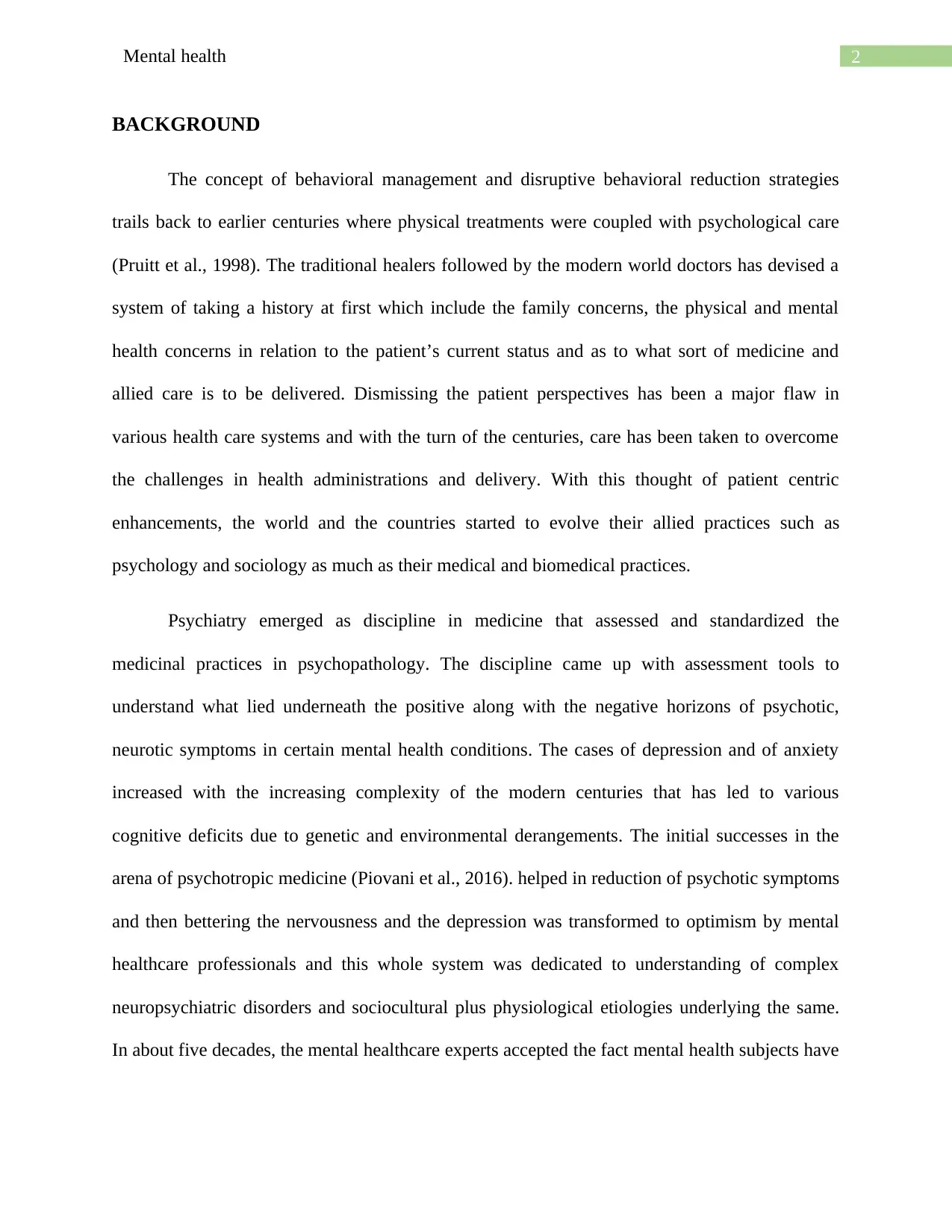
2Mental health
BACKGROUND
The concept of behavioral management and disruptive behavioral reduction strategies
trails back to earlier centuries where physical treatments were coupled with psychological care
(Pruitt et al., 1998). The traditional healers followed by the modern world doctors has devised a
system of taking a history at first which include the family concerns, the physical and mental
health concerns in relation to the patient’s current status and as to what sort of medicine and
allied care is to be delivered. Dismissing the patient perspectives has been a major flaw in
various health care systems and with the turn of the centuries, care has been taken to overcome
the challenges in health administrations and delivery. With this thought of patient centric
enhancements, the world and the countries started to evolve their allied practices such as
psychology and sociology as much as their medical and biomedical practices.
Psychiatry emerged as discipline in medicine that assessed and standardized the
medicinal practices in psychopathology. The discipline came up with assessment tools to
understand what lied underneath the positive along with the negative horizons of psychotic,
neurotic symptoms in certain mental health conditions. The cases of depression and of anxiety
increased with the increasing complexity of the modern centuries that has led to various
cognitive deficits due to genetic and environmental derangements. The initial successes in the
arena of psychotropic medicine (Piovani et al., 2016). helped in reduction of psychotic symptoms
and then bettering the nervousness and the depression was transformed to optimism by mental
healthcare professionals and this whole system was dedicated to understanding of complex
neuropsychiatric disorders and sociocultural plus physiological etiologies underlying the same.
In about five decades, the mental healthcare experts accepted the fact mental health subjects have
BACKGROUND
The concept of behavioral management and disruptive behavioral reduction strategies
trails back to earlier centuries where physical treatments were coupled with psychological care
(Pruitt et al., 1998). The traditional healers followed by the modern world doctors has devised a
system of taking a history at first which include the family concerns, the physical and mental
health concerns in relation to the patient’s current status and as to what sort of medicine and
allied care is to be delivered. Dismissing the patient perspectives has been a major flaw in
various health care systems and with the turn of the centuries, care has been taken to overcome
the challenges in health administrations and delivery. With this thought of patient centric
enhancements, the world and the countries started to evolve their allied practices such as
psychology and sociology as much as their medical and biomedical practices.
Psychiatry emerged as discipline in medicine that assessed and standardized the
medicinal practices in psychopathology. The discipline came up with assessment tools to
understand what lied underneath the positive along with the negative horizons of psychotic,
neurotic symptoms in certain mental health conditions. The cases of depression and of anxiety
increased with the increasing complexity of the modern centuries that has led to various
cognitive deficits due to genetic and environmental derangements. The initial successes in the
arena of psychotropic medicine (Piovani et al., 2016). helped in reduction of psychotic symptoms
and then bettering the nervousness and the depression was transformed to optimism by mental
healthcare professionals and this whole system was dedicated to understanding of complex
neuropsychiatric disorders and sociocultural plus physiological etiologies underlying the same.
In about five decades, the mental healthcare experts accepted the fact mental health subjects have
⊘ This is a preview!⊘
Do you want full access?
Subscribe today to unlock all pages.

Trusted by 1+ million students worldwide
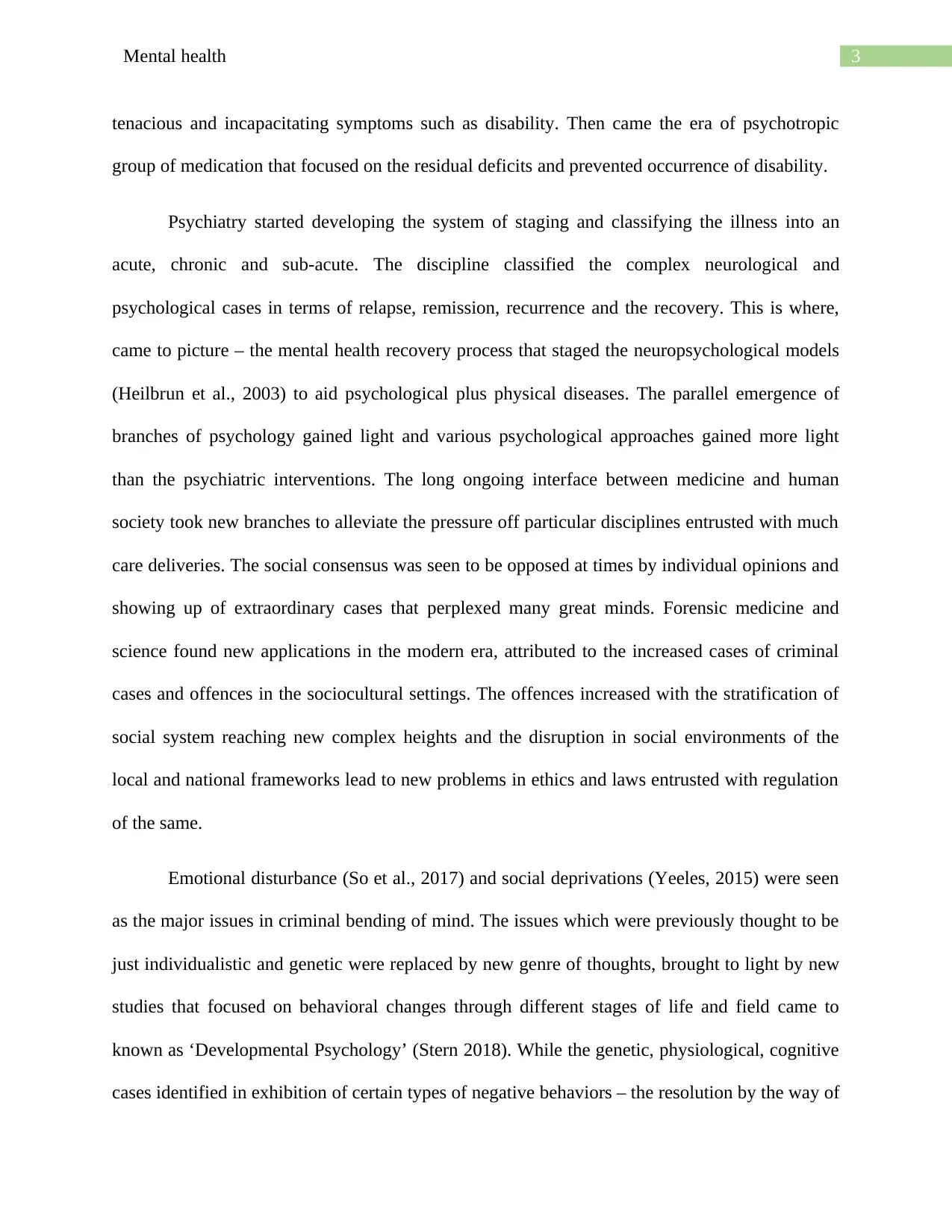
3Mental health
tenacious and incapacitating symptoms such as disability. Then came the era of psychotropic
group of medication that focused on the residual deficits and prevented occurrence of disability.
Psychiatry started developing the system of staging and classifying the illness into an
acute, chronic and sub-acute. The discipline classified the complex neurological and
psychological cases in terms of relapse, remission, recurrence and the recovery. This is where,
came to picture – the mental health recovery process that staged the neuropsychological models
(Heilbrun et al., 2003) to aid psychological plus physical diseases. The parallel emergence of
branches of psychology gained light and various psychological approaches gained more light
than the psychiatric interventions. The long ongoing interface between medicine and human
society took new branches to alleviate the pressure off particular disciplines entrusted with much
care deliveries. The social consensus was seen to be opposed at times by individual opinions and
showing up of extraordinary cases that perplexed many great minds. Forensic medicine and
science found new applications in the modern era, attributed to the increased cases of criminal
cases and offences in the sociocultural settings. The offences increased with the stratification of
social system reaching new complex heights and the disruption in social environments of the
local and national frameworks lead to new problems in ethics and laws entrusted with regulation
of the same.
Emotional disturbance (So et al., 2017) and social deprivations (Yeeles, 2015) were seen
as the major issues in criminal bending of mind. The issues which were previously thought to be
just individualistic and genetic were replaced by new genre of thoughts, brought to light by new
studies that focused on behavioral changes through different stages of life and field came to
known as ‘Developmental Psychology’ (Stern 2018). While the genetic, physiological, cognitive
cases identified in exhibition of certain types of negative behaviors – the resolution by the way of
tenacious and incapacitating symptoms such as disability. Then came the era of psychotropic
group of medication that focused on the residual deficits and prevented occurrence of disability.
Psychiatry started developing the system of staging and classifying the illness into an
acute, chronic and sub-acute. The discipline classified the complex neurological and
psychological cases in terms of relapse, remission, recurrence and the recovery. This is where,
came to picture – the mental health recovery process that staged the neuropsychological models
(Heilbrun et al., 2003) to aid psychological plus physical diseases. The parallel emergence of
branches of psychology gained light and various psychological approaches gained more light
than the psychiatric interventions. The long ongoing interface between medicine and human
society took new branches to alleviate the pressure off particular disciplines entrusted with much
care deliveries. The social consensus was seen to be opposed at times by individual opinions and
showing up of extraordinary cases that perplexed many great minds. Forensic medicine and
science found new applications in the modern era, attributed to the increased cases of criminal
cases and offences in the sociocultural settings. The offences increased with the stratification of
social system reaching new complex heights and the disruption in social environments of the
local and national frameworks lead to new problems in ethics and laws entrusted with regulation
of the same.
Emotional disturbance (So et al., 2017) and social deprivations (Yeeles, 2015) were seen
as the major issues in criminal bending of mind. The issues which were previously thought to be
just individualistic and genetic were replaced by new genre of thoughts, brought to light by new
studies that focused on behavioral changes through different stages of life and field came to
known as ‘Developmental Psychology’ (Stern 2018). While the genetic, physiological, cognitive
cases identified in exhibition of certain types of negative behaviors – the resolution by the way of
Paraphrase This Document
Need a fresh take? Get an instant paraphrase of this document with our AI Paraphraser
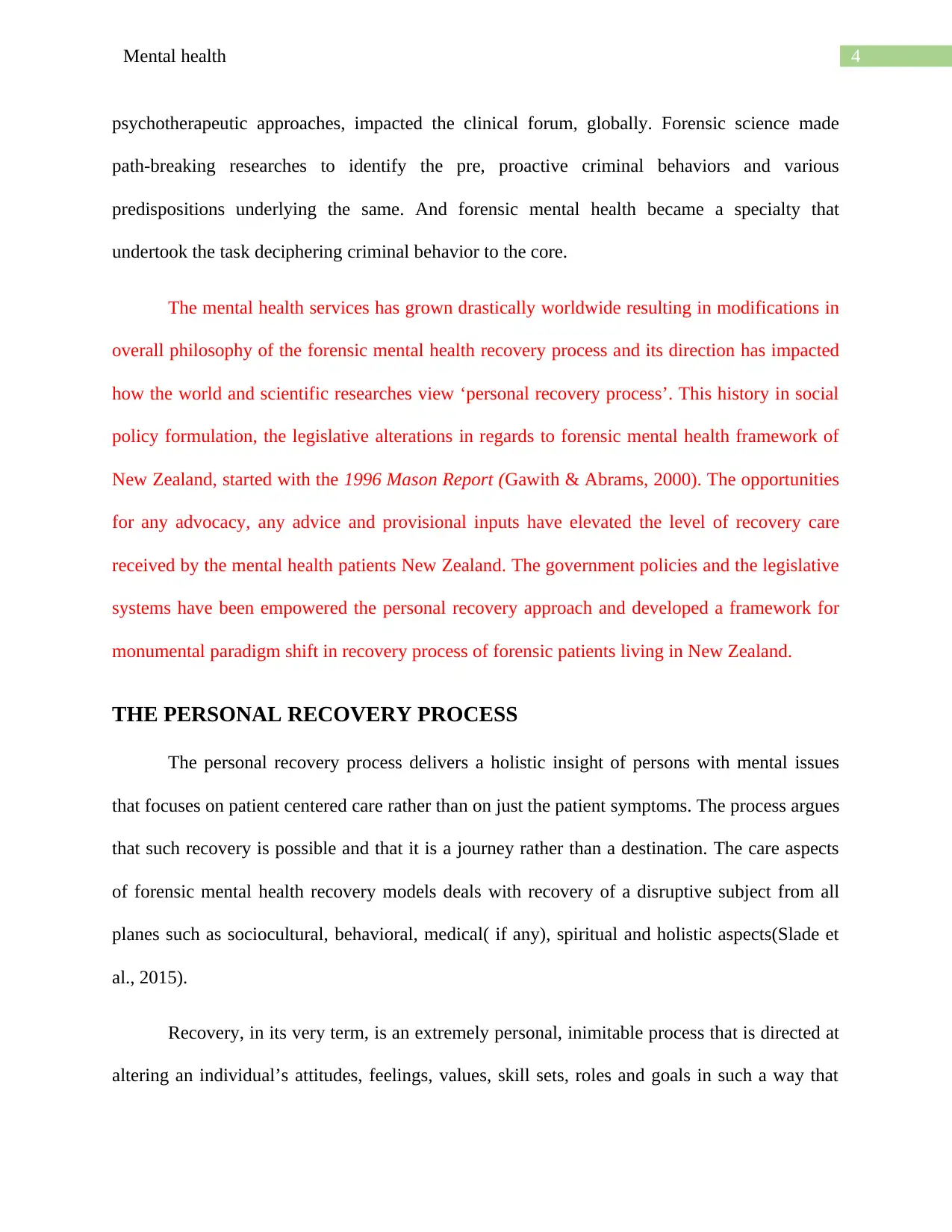
4Mental health
psychotherapeutic approaches, impacted the clinical forum, globally. Forensic science made
path-breaking researches to identify the pre, proactive criminal behaviors and various
predispositions underlying the same. And forensic mental health became a specialty that
undertook the task deciphering criminal behavior to the core.
The mental health services has grown drastically worldwide resulting in modifications in
overall philosophy of the forensic mental health recovery process and its direction has impacted
how the world and scientific researches view ‘personal recovery process’. This history in social
policy formulation, the legislative alterations in regards to forensic mental health framework of
New Zealand, started with the 1996 Mason Report (Gawith & Abrams, 2000). The opportunities
for any advocacy, any advice and provisional inputs have elevated the level of recovery care
received by the mental health patients New Zealand. The government policies and the legislative
systems have been empowered the personal recovery approach and developed a framework for
monumental paradigm shift in recovery process of forensic patients living in New Zealand.
THE PERSONAL RECOVERY PROCESS
The personal recovery process delivers a holistic insight of persons with mental issues
that focuses on patient centered care rather than on just the patient symptoms. The process argues
that such recovery is possible and that it is a journey rather than a destination. The care aspects
of forensic mental health recovery models deals with recovery of a disruptive subject from all
planes such as sociocultural, behavioral, medical( if any), spiritual and holistic aspects(Slade et
al., 2015).
Recovery, in its very term, is an extremely personal, inimitable process that is directed at
altering an individual’s attitudes, feelings, values, skill sets, roles and goals in such a way that
psychotherapeutic approaches, impacted the clinical forum, globally. Forensic science made
path-breaking researches to identify the pre, proactive criminal behaviors and various
predispositions underlying the same. And forensic mental health became a specialty that
undertook the task deciphering criminal behavior to the core.
The mental health services has grown drastically worldwide resulting in modifications in
overall philosophy of the forensic mental health recovery process and its direction has impacted
how the world and scientific researches view ‘personal recovery process’. This history in social
policy formulation, the legislative alterations in regards to forensic mental health framework of
New Zealand, started with the 1996 Mason Report (Gawith & Abrams, 2000). The opportunities
for any advocacy, any advice and provisional inputs have elevated the level of recovery care
received by the mental health patients New Zealand. The government policies and the legislative
systems have been empowered the personal recovery approach and developed a framework for
monumental paradigm shift in recovery process of forensic patients living in New Zealand.
THE PERSONAL RECOVERY PROCESS
The personal recovery process delivers a holistic insight of persons with mental issues
that focuses on patient centered care rather than on just the patient symptoms. The process argues
that such recovery is possible and that it is a journey rather than a destination. The care aspects
of forensic mental health recovery models deals with recovery of a disruptive subject from all
planes such as sociocultural, behavioral, medical( if any), spiritual and holistic aspects(Slade et
al., 2015).
Recovery, in its very term, is an extremely personal, inimitable process that is directed at
altering an individual’s attitudes, feelings, values, skill sets, roles and goals in such a way that
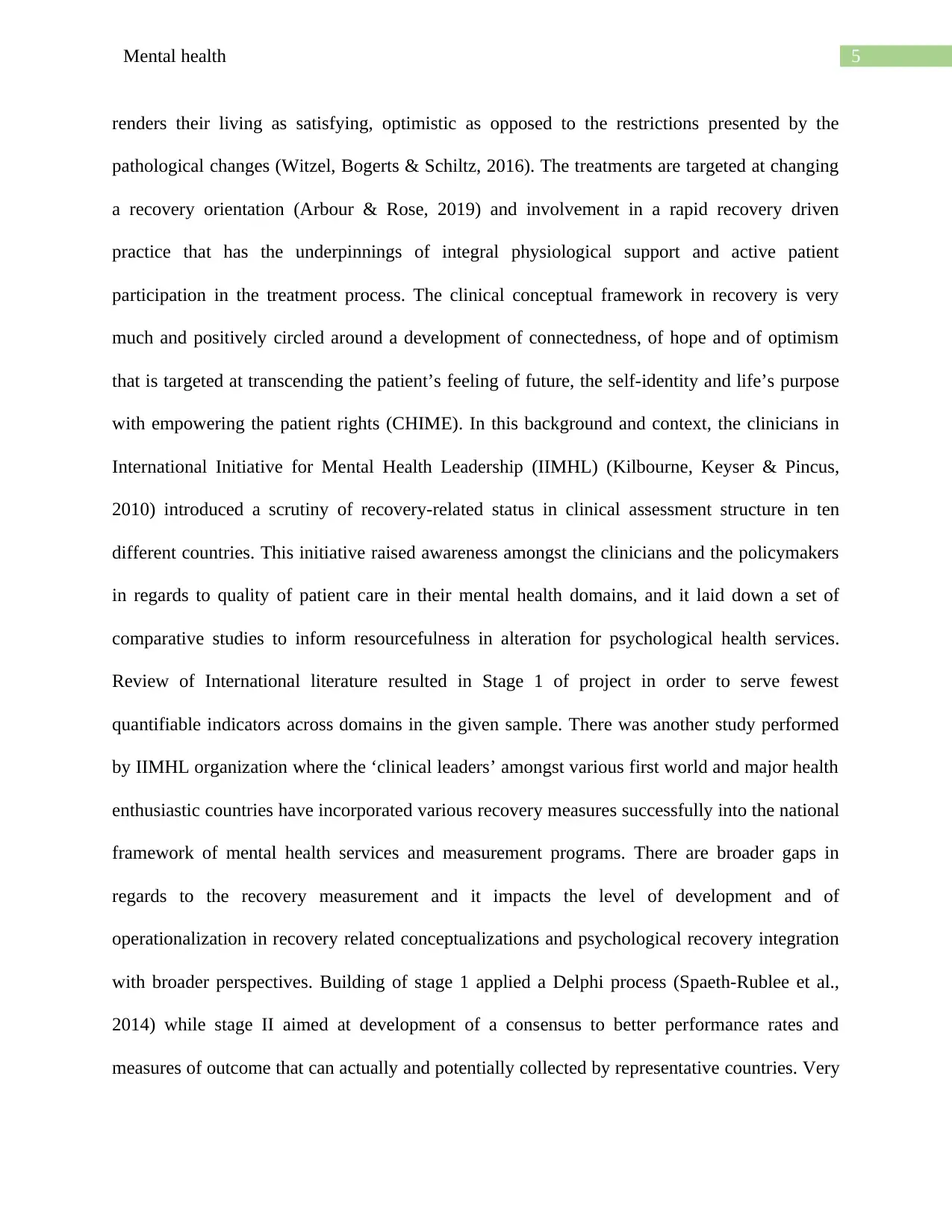
5Mental health
renders their living as satisfying, optimistic as opposed to the restrictions presented by the
pathological changes (Witzel, Bogerts & Schiltz, 2016). The treatments are targeted at changing
a recovery orientation (Arbour & Rose, 2019) and involvement in a rapid recovery driven
practice that has the underpinnings of integral physiological support and active patient
participation in the treatment process. The clinical conceptual framework in recovery is very
much and positively circled around a development of connectedness, of hope and of optimism
that is targeted at transcending the patient’s feeling of future, the self-identity and life’s purpose
with empowering the patient rights (CHIME). In this background and context, the clinicians in
International Initiative for Mental Health Leadership (IIMHL) (Kilbourne, Keyser & Pincus,
2010) introduced a scrutiny of recovery-related status in clinical assessment structure in ten
different countries. This initiative raised awareness amongst the clinicians and the policymakers
in regards to quality of patient care in their mental health domains, and it laid down a set of
comparative studies to inform resourcefulness in alteration for psychological health services.
Review of International literature resulted in Stage 1 of project in order to serve fewest
quantifiable indicators across domains in the given sample. There was another study performed
by IIMHL organization where the ‘clinical leaders’ amongst various first world and major health
enthusiastic countries have incorporated various recovery measures successfully into the national
framework of mental health services and measurement programs. There are broader gaps in
regards to the recovery measurement and it impacts the level of development and of
operationalization in recovery related conceptualizations and psychological recovery integration
with broader perspectives. Building of stage 1 applied a Delphi process (Spaeth-Rublee et al.,
2014) while stage II aimed at development of a consensus to better performance rates and
measures of outcome that can actually and potentially collected by representative countries. Very
renders their living as satisfying, optimistic as opposed to the restrictions presented by the
pathological changes (Witzel, Bogerts & Schiltz, 2016). The treatments are targeted at changing
a recovery orientation (Arbour & Rose, 2019) and involvement in a rapid recovery driven
practice that has the underpinnings of integral physiological support and active patient
participation in the treatment process. The clinical conceptual framework in recovery is very
much and positively circled around a development of connectedness, of hope and of optimism
that is targeted at transcending the patient’s feeling of future, the self-identity and life’s purpose
with empowering the patient rights (CHIME). In this background and context, the clinicians in
International Initiative for Mental Health Leadership (IIMHL) (Kilbourne, Keyser & Pincus,
2010) introduced a scrutiny of recovery-related status in clinical assessment structure in ten
different countries. This initiative raised awareness amongst the clinicians and the policymakers
in regards to quality of patient care in their mental health domains, and it laid down a set of
comparative studies to inform resourcefulness in alteration for psychological health services.
Review of International literature resulted in Stage 1 of project in order to serve fewest
quantifiable indicators across domains in the given sample. There was another study performed
by IIMHL organization where the ‘clinical leaders’ amongst various first world and major health
enthusiastic countries have incorporated various recovery measures successfully into the national
framework of mental health services and measurement programs. There are broader gaps in
regards to the recovery measurement and it impacts the level of development and of
operationalization in recovery related conceptualizations and psychological recovery integration
with broader perspectives. Building of stage 1 applied a Delphi process (Spaeth-Rublee et al.,
2014) while stage II aimed at development of a consensus to better performance rates and
measures of outcome that can actually and potentially collected by representative countries. Very
⊘ This is a preview!⊘
Do you want full access?
Subscribe today to unlock all pages.

Trusted by 1+ million students worldwide
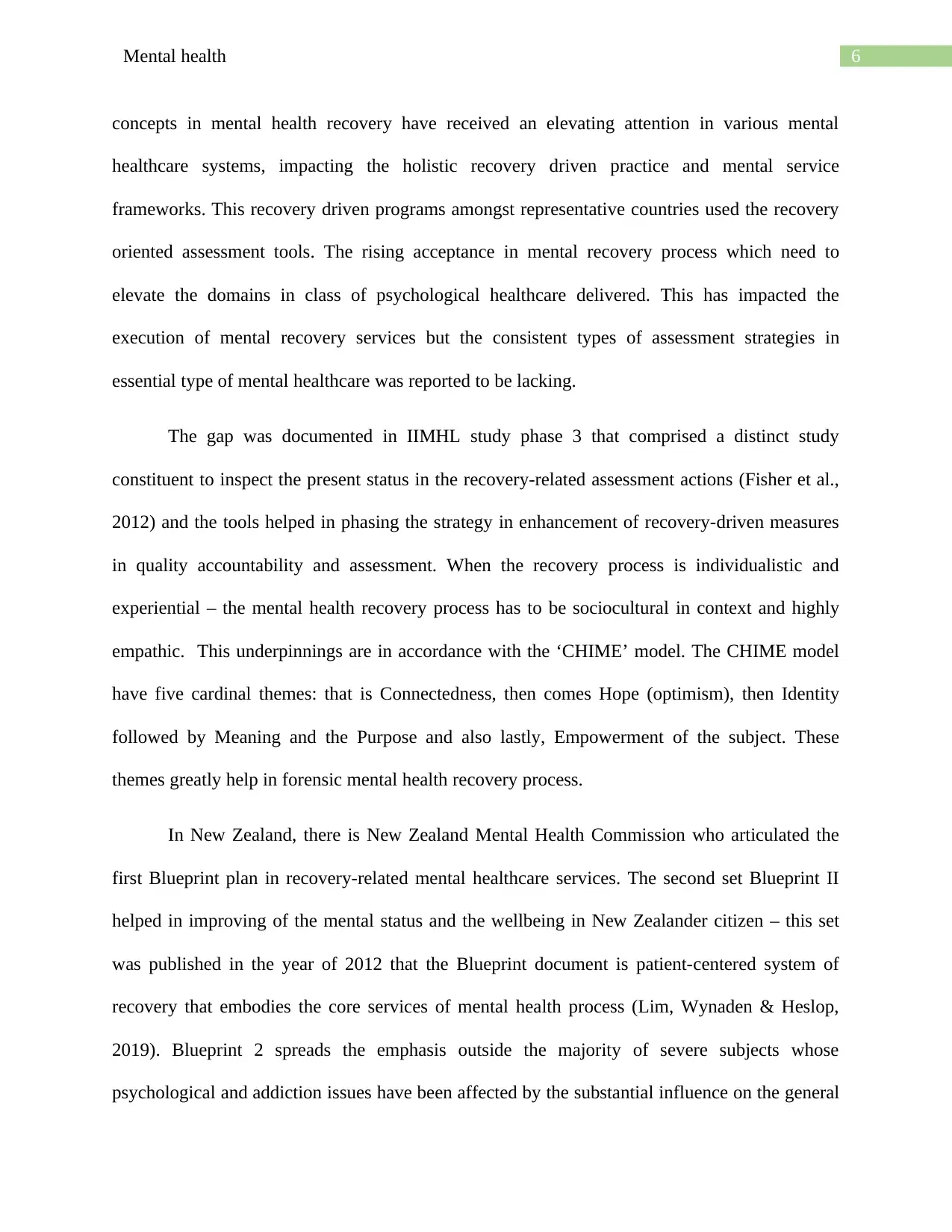
6Mental health
concepts in mental health recovery have received an elevating attention in various mental
healthcare systems, impacting the holistic recovery driven practice and mental service
frameworks. This recovery driven programs amongst representative countries used the recovery
oriented assessment tools. The rising acceptance in mental recovery process which need to
elevate the domains in class of psychological healthcare delivered. This has impacted the
execution of mental recovery services but the consistent types of assessment strategies in
essential type of mental healthcare was reported to be lacking.
The gap was documented in IIMHL study phase 3 that comprised a distinct study
constituent to inspect the present status in the recovery-related assessment actions (Fisher et al.,
2012) and the tools helped in phasing the strategy in enhancement of recovery-driven measures
in quality accountability and assessment. When the recovery process is individualistic and
experiential – the mental health recovery process has to be sociocultural in context and highly
empathic. This underpinnings are in accordance with the ‘CHIME’ model. The CHIME model
have five cardinal themes: that is Connectedness, then comes Hope (optimism), then Identity
followed by Meaning and the Purpose and also lastly, Empowerment of the subject. These
themes greatly help in forensic mental health recovery process.
In New Zealand, there is New Zealand Mental Health Commission who articulated the
first Blueprint plan in recovery-related mental healthcare services. The second set Blueprint II
helped in improving of the mental status and the wellbeing in New Zealander citizen – this set
was published in the year of 2012 that the Blueprint document is patient-centered system of
recovery that embodies the core services of mental health process (Lim, Wynaden & Heslop,
2019). Blueprint 2 spreads the emphasis outside the majority of severe subjects whose
psychological and addiction issues have been affected by the substantial influence on the general
concepts in mental health recovery have received an elevating attention in various mental
healthcare systems, impacting the holistic recovery driven practice and mental service
frameworks. This recovery driven programs amongst representative countries used the recovery
oriented assessment tools. The rising acceptance in mental recovery process which need to
elevate the domains in class of psychological healthcare delivered. This has impacted the
execution of mental recovery services but the consistent types of assessment strategies in
essential type of mental healthcare was reported to be lacking.
The gap was documented in IIMHL study phase 3 that comprised a distinct study
constituent to inspect the present status in the recovery-related assessment actions (Fisher et al.,
2012) and the tools helped in phasing the strategy in enhancement of recovery-driven measures
in quality accountability and assessment. When the recovery process is individualistic and
experiential – the mental health recovery process has to be sociocultural in context and highly
empathic. This underpinnings are in accordance with the ‘CHIME’ model. The CHIME model
have five cardinal themes: that is Connectedness, then comes Hope (optimism), then Identity
followed by Meaning and the Purpose and also lastly, Empowerment of the subject. These
themes greatly help in forensic mental health recovery process.
In New Zealand, there is New Zealand Mental Health Commission who articulated the
first Blueprint plan in recovery-related mental healthcare services. The second set Blueprint II
helped in improving of the mental status and the wellbeing in New Zealander citizen – this set
was published in the year of 2012 that the Blueprint document is patient-centered system of
recovery that embodies the core services of mental health process (Lim, Wynaden & Heslop,
2019). Blueprint 2 spreads the emphasis outside the majority of severe subjects whose
psychological and addiction issues have been affected by the substantial influence on the general
Paraphrase This Document
Need a fresh take? Get an instant paraphrase of this document with our AI Paraphraser
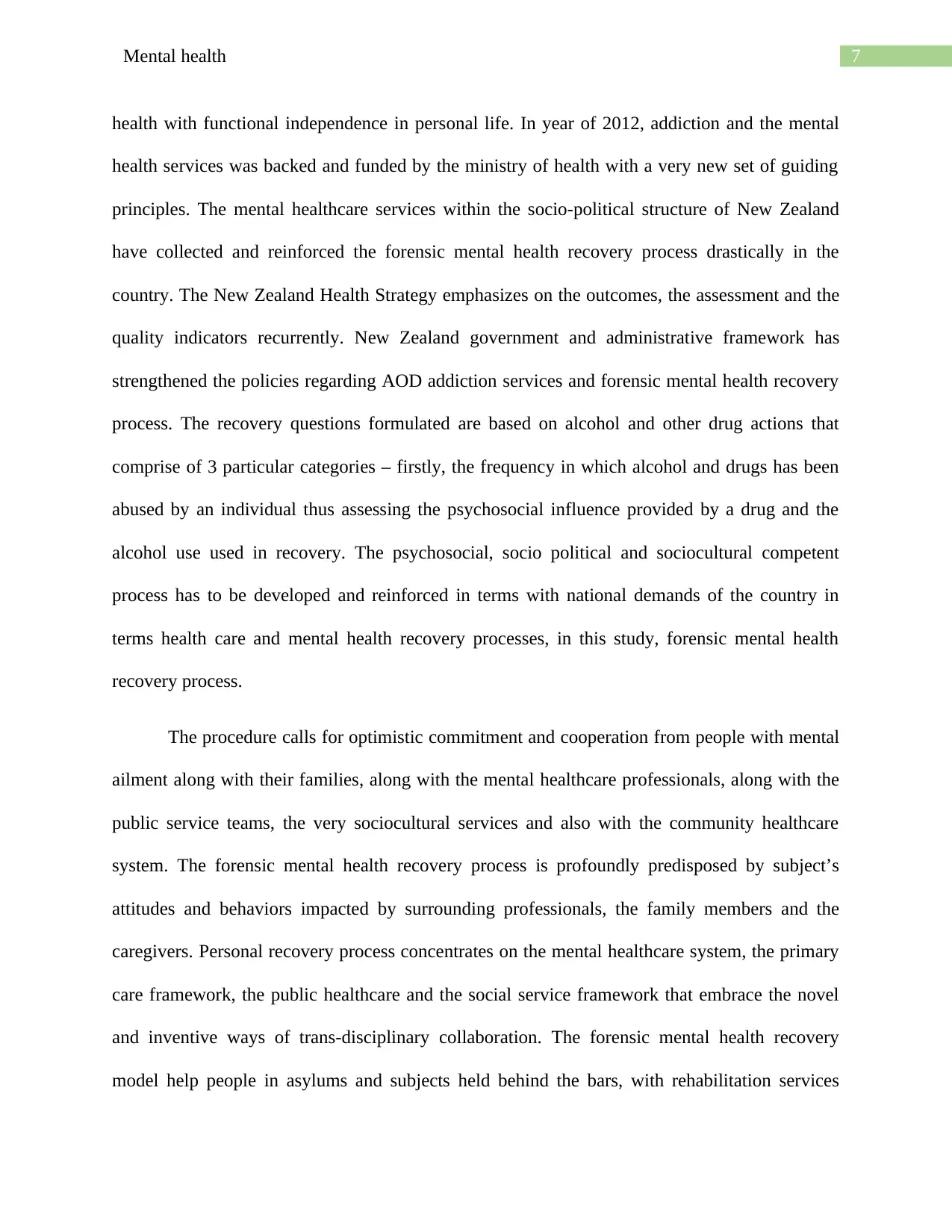
7Mental health
health with functional independence in personal life. In year of 2012, addiction and the mental
health services was backed and funded by the ministry of health with a very new set of guiding
principles. The mental healthcare services within the socio-political structure of New Zealand
have collected and reinforced the forensic mental health recovery process drastically in the
country. The New Zealand Health Strategy emphasizes on the outcomes, the assessment and the
quality indicators recurrently. New Zealand government and administrative framework has
strengthened the policies regarding AOD addiction services and forensic mental health recovery
process. The recovery questions formulated are based on alcohol and other drug actions that
comprise of 3 particular categories – firstly, the frequency in which alcohol and drugs has been
abused by an individual thus assessing the psychosocial influence provided by a drug and the
alcohol use used in recovery. The psychosocial, socio political and sociocultural competent
process has to be developed and reinforced in terms with national demands of the country in
terms health care and mental health recovery processes, in this study, forensic mental health
recovery process.
The procedure calls for optimistic commitment and cooperation from people with mental
ailment along with their families, along with the mental healthcare professionals, along with the
public service teams, the very sociocultural services and also with the community healthcare
system. The forensic mental health recovery process is profoundly predisposed by subject’s
attitudes and behaviors impacted by surrounding professionals, the family members and the
caregivers. Personal recovery process concentrates on the mental healthcare system, the primary
care framework, the public healthcare and the social service framework that embrace the novel
and inventive ways of trans-disciplinary collaboration. The forensic mental health recovery
model help people in asylums and subjects held behind the bars, with rehabilitation services
health with functional independence in personal life. In year of 2012, addiction and the mental
health services was backed and funded by the ministry of health with a very new set of guiding
principles. The mental healthcare services within the socio-political structure of New Zealand
have collected and reinforced the forensic mental health recovery process drastically in the
country. The New Zealand Health Strategy emphasizes on the outcomes, the assessment and the
quality indicators recurrently. New Zealand government and administrative framework has
strengthened the policies regarding AOD addiction services and forensic mental health recovery
process. The recovery questions formulated are based on alcohol and other drug actions that
comprise of 3 particular categories – firstly, the frequency in which alcohol and drugs has been
abused by an individual thus assessing the psychosocial influence provided by a drug and the
alcohol use used in recovery. The psychosocial, socio political and sociocultural competent
process has to be developed and reinforced in terms with national demands of the country in
terms health care and mental health recovery processes, in this study, forensic mental health
recovery process.
The procedure calls for optimistic commitment and cooperation from people with mental
ailment along with their families, along with the mental healthcare professionals, along with the
public service teams, the very sociocultural services and also with the community healthcare
system. The forensic mental health recovery process is profoundly predisposed by subject’s
attitudes and behaviors impacted by surrounding professionals, the family members and the
caregivers. Personal recovery process concentrates on the mental healthcare system, the primary
care framework, the public healthcare and the social service framework that embrace the novel
and inventive ways of trans-disciplinary collaboration. The forensic mental health recovery
model help people in asylums and subjects held behind the bars, with rehabilitation services
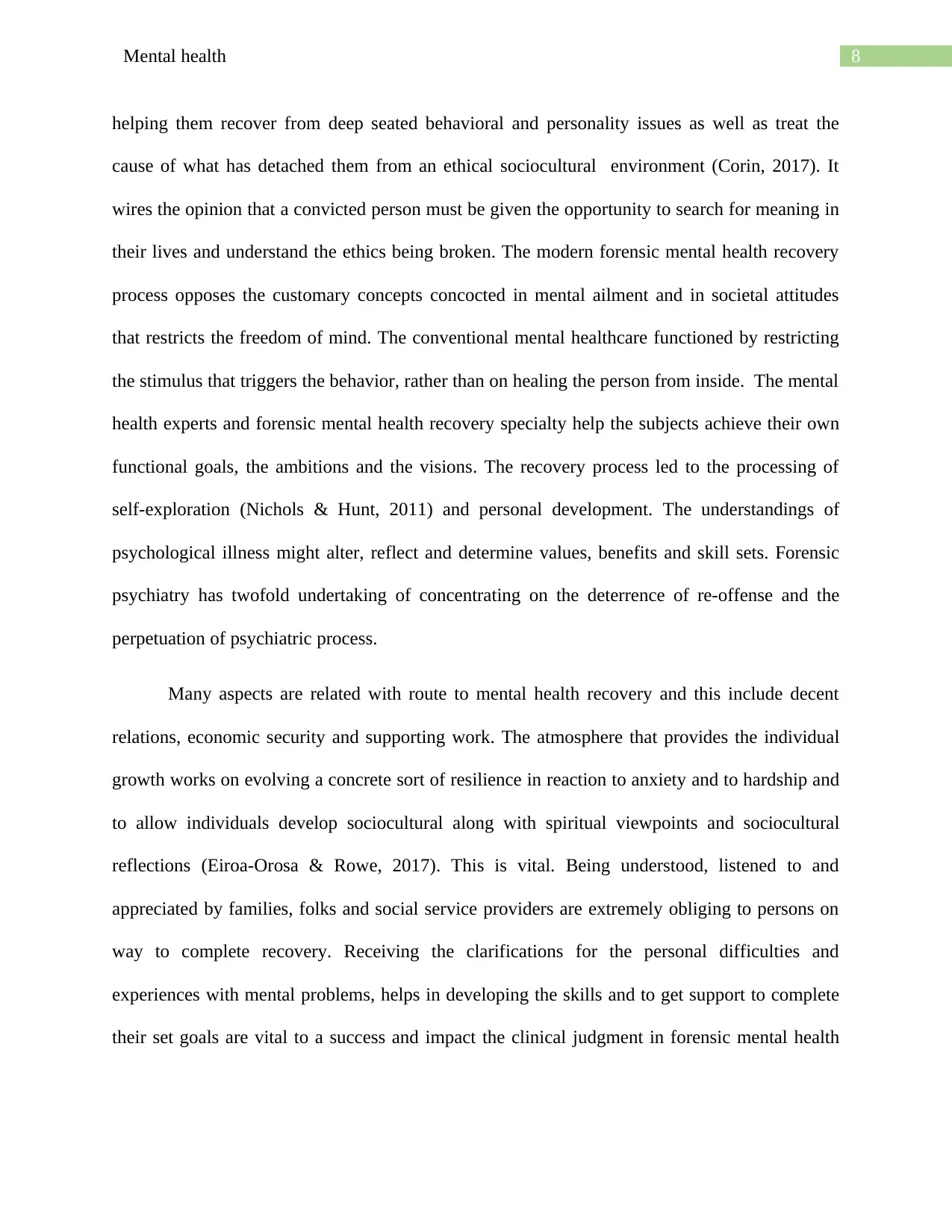
8Mental health
helping them recover from deep seated behavioral and personality issues as well as treat the
cause of what has detached them from an ethical sociocultural environment (Corin, 2017). It
wires the opinion that a convicted person must be given the opportunity to search for meaning in
their lives and understand the ethics being broken. The modern forensic mental health recovery
process opposes the customary concepts concocted in mental ailment and in societal attitudes
that restricts the freedom of mind. The conventional mental healthcare functioned by restricting
the stimulus that triggers the behavior, rather than on healing the person from inside. The mental
health experts and forensic mental health recovery specialty help the subjects achieve their own
functional goals, the ambitions and the visions. The recovery process led to the processing of
self-exploration (Nichols & Hunt, 2011) and personal development. The understandings of
psychological illness might alter, reflect and determine values, benefits and skill sets. Forensic
psychiatry has twofold undertaking of concentrating on the deterrence of re-offense and the
perpetuation of psychiatric process.
Many aspects are related with route to mental health recovery and this include decent
relations, economic security and supporting work. The atmosphere that provides the individual
growth works on evolving a concrete sort of resilience in reaction to anxiety and to hardship and
to allow individuals develop sociocultural along with spiritual viewpoints and sociocultural
reflections (Eiroa-Orosa & Rowe, 2017). This is vital. Being understood, listened to and
appreciated by families, folks and social service providers are extremely obliging to persons on
way to complete recovery. Receiving the clarifications for the personal difficulties and
experiences with mental problems, helps in developing the skills and to get support to complete
their set goals are vital to a success and impact the clinical judgment in forensic mental health
helping them recover from deep seated behavioral and personality issues as well as treat the
cause of what has detached them from an ethical sociocultural environment (Corin, 2017). It
wires the opinion that a convicted person must be given the opportunity to search for meaning in
their lives and understand the ethics being broken. The modern forensic mental health recovery
process opposes the customary concepts concocted in mental ailment and in societal attitudes
that restricts the freedom of mind. The conventional mental healthcare functioned by restricting
the stimulus that triggers the behavior, rather than on healing the person from inside. The mental
health experts and forensic mental health recovery specialty help the subjects achieve their own
functional goals, the ambitions and the visions. The recovery process led to the processing of
self-exploration (Nichols & Hunt, 2011) and personal development. The understandings of
psychological illness might alter, reflect and determine values, benefits and skill sets. Forensic
psychiatry has twofold undertaking of concentrating on the deterrence of re-offense and the
perpetuation of psychiatric process.
Many aspects are related with route to mental health recovery and this include decent
relations, economic security and supporting work. The atmosphere that provides the individual
growth works on evolving a concrete sort of resilience in reaction to anxiety and to hardship and
to allow individuals develop sociocultural along with spiritual viewpoints and sociocultural
reflections (Eiroa-Orosa & Rowe, 2017). This is vital. Being understood, listened to and
appreciated by families, folks and social service providers are extremely obliging to persons on
way to complete recovery. Receiving the clarifications for the personal difficulties and
experiences with mental problems, helps in developing the skills and to get support to complete
their set goals are vital to a success and impact the clinical judgment in forensic mental health
⊘ This is a preview!⊘
Do you want full access?
Subscribe today to unlock all pages.

Trusted by 1+ million students worldwide
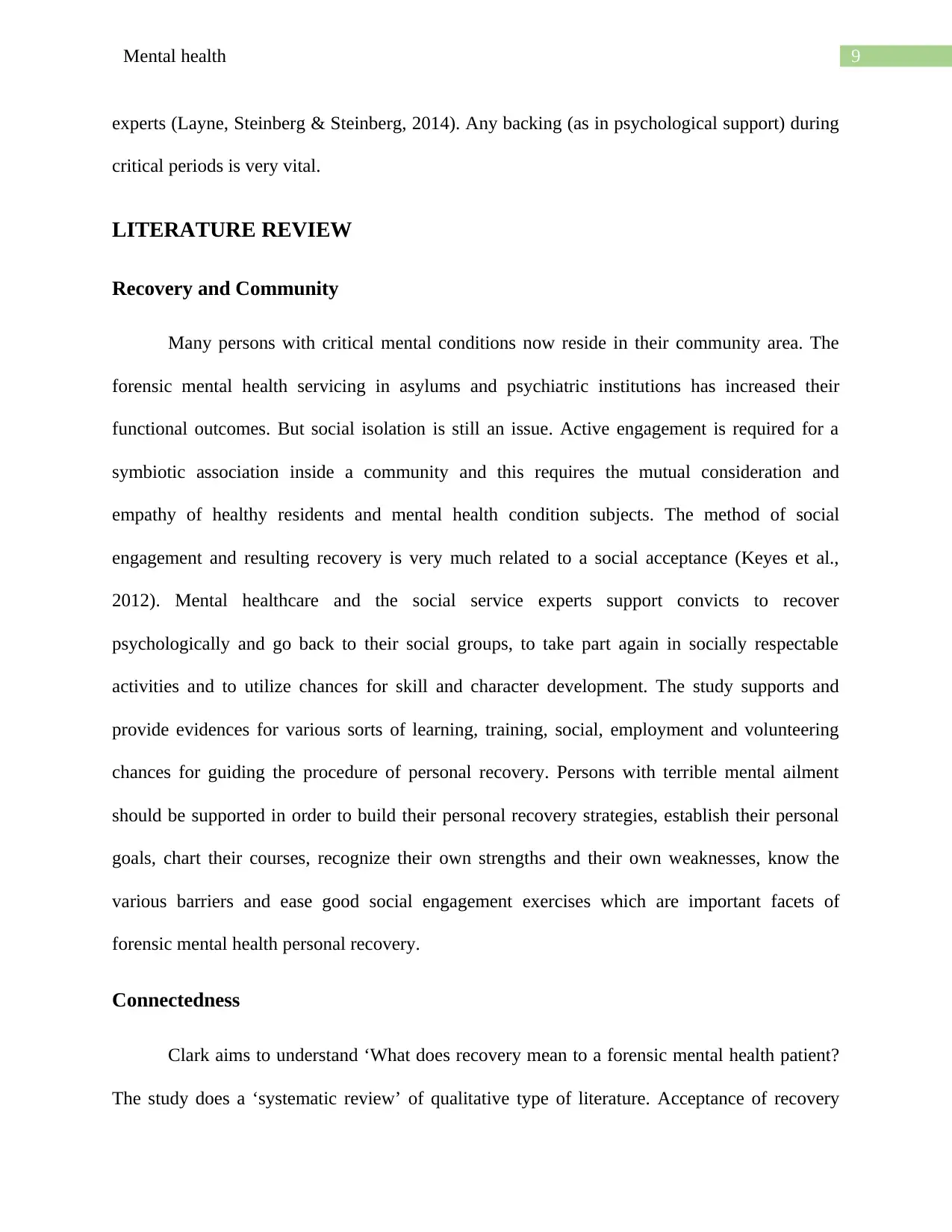
9Mental health
experts (Layne, Steinberg & Steinberg, 2014). Any backing (as in psychological support) during
critical periods is very vital.
LITERATURE REVIEW
Recovery and Community
Many persons with critical mental conditions now reside in their community area. The
forensic mental health servicing in asylums and psychiatric institutions has increased their
functional outcomes. But social isolation is still an issue. Active engagement is required for a
symbiotic association inside a community and this requires the mutual consideration and
empathy of healthy residents and mental health condition subjects. The method of social
engagement and resulting recovery is very much related to a social acceptance (Keyes et al.,
2012). Mental healthcare and the social service experts support convicts to recover
psychologically and go back to their social groups, to take part again in socially respectable
activities and to utilize chances for skill and character development. The study supports and
provide evidences for various sorts of learning, training, social, employment and volunteering
chances for guiding the procedure of personal recovery. Persons with terrible mental ailment
should be supported in order to build their personal recovery strategies, establish their personal
goals, chart their courses, recognize their own strengths and their own weaknesses, know the
various barriers and ease good social engagement exercises which are important facets of
forensic mental health personal recovery.
Connectedness
Clark aims to understand ‘What does recovery mean to a forensic mental health patient?
The study does a ‘systematic review’ of qualitative type of literature. Acceptance of recovery
experts (Layne, Steinberg & Steinberg, 2014). Any backing (as in psychological support) during
critical periods is very vital.
LITERATURE REVIEW
Recovery and Community
Many persons with critical mental conditions now reside in their community area. The
forensic mental health servicing in asylums and psychiatric institutions has increased their
functional outcomes. But social isolation is still an issue. Active engagement is required for a
symbiotic association inside a community and this requires the mutual consideration and
empathy of healthy residents and mental health condition subjects. The method of social
engagement and resulting recovery is very much related to a social acceptance (Keyes et al.,
2012). Mental healthcare and the social service experts support convicts to recover
psychologically and go back to their social groups, to take part again in socially respectable
activities and to utilize chances for skill and character development. The study supports and
provide evidences for various sorts of learning, training, social, employment and volunteering
chances for guiding the procedure of personal recovery. Persons with terrible mental ailment
should be supported in order to build their personal recovery strategies, establish their personal
goals, chart their courses, recognize their own strengths and their own weaknesses, know the
various barriers and ease good social engagement exercises which are important facets of
forensic mental health personal recovery.
Connectedness
Clark aims to understand ‘What does recovery mean to a forensic mental health patient?
The study does a ‘systematic review’ of qualitative type of literature. Acceptance of recovery
Paraphrase This Document
Need a fresh take? Get an instant paraphrase of this document with our AI Paraphraser
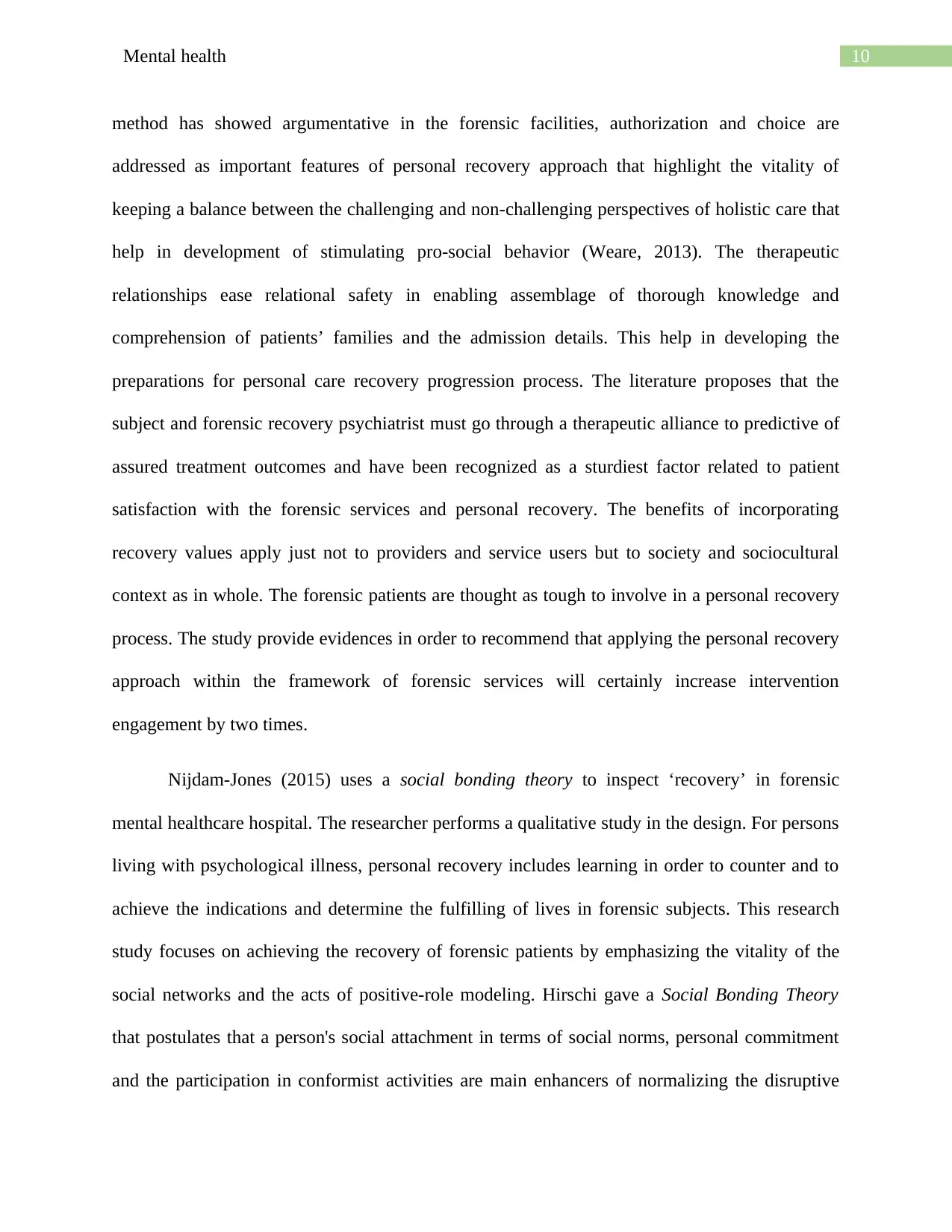
10Mental health
method has showed argumentative in the forensic facilities, authorization and choice are
addressed as important features of personal recovery approach that highlight the vitality of
keeping a balance between the challenging and non-challenging perspectives of holistic care that
help in development of stimulating pro-social behavior (Weare, 2013). The therapeutic
relationships ease relational safety in enabling assemblage of thorough knowledge and
comprehension of patients’ families and the admission details. This help in developing the
preparations for personal care recovery progression process. The literature proposes that the
subject and forensic recovery psychiatrist must go through a therapeutic alliance to predictive of
assured treatment outcomes and have been recognized as a sturdiest factor related to patient
satisfaction with the forensic services and personal recovery. The benefits of incorporating
recovery values apply just not to providers and service users but to society and sociocultural
context as in whole. The forensic patients are thought as tough to involve in a personal recovery
process. The study provide evidences in order to recommend that applying the personal recovery
approach within the framework of forensic services will certainly increase intervention
engagement by two times.
Nijdam‐Jones (2015) uses a social bonding theory to inspect ‘recovery’ in forensic
mental healthcare hospital. The researcher performs a qualitative study in the design. For persons
living with psychological illness, personal recovery includes learning in order to counter and to
achieve the indications and determine the fulfilling of lives in forensic subjects. This research
study focuses on achieving the recovery of forensic patients by emphasizing the vitality of the
social networks and the acts of positive-role modeling. Hirschi gave a Social Bonding Theory
that postulates that a person's social attachment in terms of social norms, personal commitment
and the participation in conformist activities are main enhancers of normalizing the disruptive
method has showed argumentative in the forensic facilities, authorization and choice are
addressed as important features of personal recovery approach that highlight the vitality of
keeping a balance between the challenging and non-challenging perspectives of holistic care that
help in development of stimulating pro-social behavior (Weare, 2013). The therapeutic
relationships ease relational safety in enabling assemblage of thorough knowledge and
comprehension of patients’ families and the admission details. This help in developing the
preparations for personal care recovery progression process. The literature proposes that the
subject and forensic recovery psychiatrist must go through a therapeutic alliance to predictive of
assured treatment outcomes and have been recognized as a sturdiest factor related to patient
satisfaction with the forensic services and personal recovery. The benefits of incorporating
recovery values apply just not to providers and service users but to society and sociocultural
context as in whole. The forensic patients are thought as tough to involve in a personal recovery
process. The study provide evidences in order to recommend that applying the personal recovery
approach within the framework of forensic services will certainly increase intervention
engagement by two times.
Nijdam‐Jones (2015) uses a social bonding theory to inspect ‘recovery’ in forensic
mental healthcare hospital. The researcher performs a qualitative study in the design. For persons
living with psychological illness, personal recovery includes learning in order to counter and to
achieve the indications and determine the fulfilling of lives in forensic subjects. This research
study focuses on achieving the recovery of forensic patients by emphasizing the vitality of the
social networks and the acts of positive-role modeling. Hirschi gave a Social Bonding Theory
that postulates that a person's social attachment in terms of social norms, personal commitment
and the participation in conformist activities are main enhancers of normalizing the disruptive
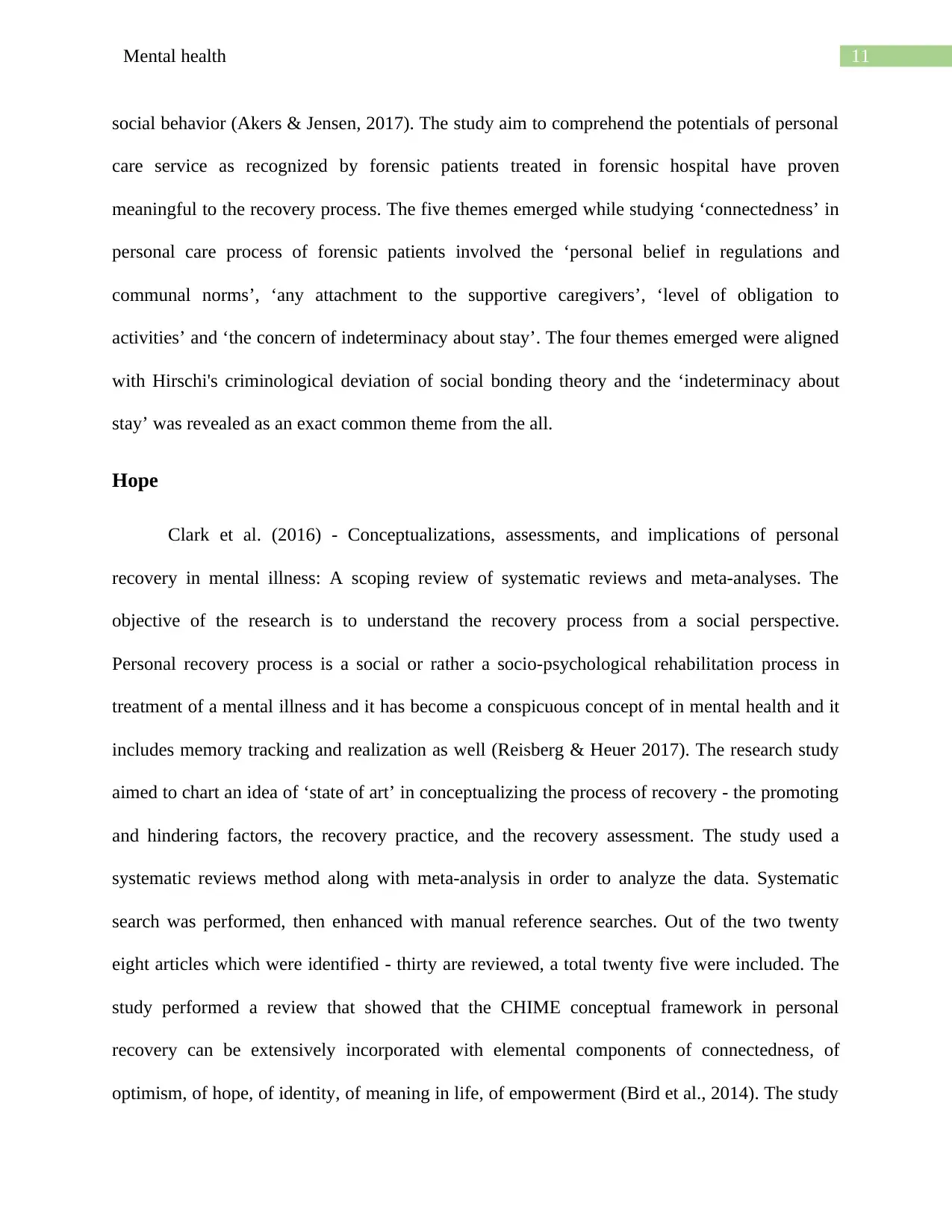
11Mental health
social behavior (Akers & Jensen, 2017). The study aim to comprehend the potentials of personal
care service as recognized by forensic patients treated in forensic hospital have proven
meaningful to the recovery process. The five themes emerged while studying ‘connectedness’ in
personal care process of forensic patients involved the ‘personal belief in regulations and
communal norms’, ‘any attachment to the supportive caregivers’, ‘level of obligation to
activities’ and ‘the concern of indeterminacy about stay’. The four themes emerged were aligned
with Hirschi's criminological deviation of social bonding theory and the ‘indeterminacy about
stay’ was revealed as an exact common theme from the all.
Hope
Clark et al. (2016) - Conceptualizations, assessments, and implications of personal
recovery in mental illness: A scoping review of systematic reviews and meta-analyses. The
objective of the research is to understand the recovery process from a social perspective.
Personal recovery process is a social or rather a socio-psychological rehabilitation process in
treatment of a mental illness and it has become a conspicuous concept of in mental health and it
includes memory tracking and realization as well (Reisberg & Heuer 2017). The research study
aimed to chart an idea of ‘state of art’ in conceptualizing the process of recovery - the promoting
and hindering factors, the recovery practice, and the recovery assessment. The study used a
systematic reviews method along with meta-analysis in order to analyze the data. Systematic
search was performed, then enhanced with manual reference searches. Out of the two twenty
eight articles which were identified - thirty are reviewed, a total twenty five were included. The
study performed a review that showed that the CHIME conceptual framework in personal
recovery can be extensively incorporated with elemental components of connectedness, of
optimism, of hope, of identity, of meaning in life, of empowerment (Bird et al., 2014). The study
social behavior (Akers & Jensen, 2017). The study aim to comprehend the potentials of personal
care service as recognized by forensic patients treated in forensic hospital have proven
meaningful to the recovery process. The five themes emerged while studying ‘connectedness’ in
personal care process of forensic patients involved the ‘personal belief in regulations and
communal norms’, ‘any attachment to the supportive caregivers’, ‘level of obligation to
activities’ and ‘the concern of indeterminacy about stay’. The four themes emerged were aligned
with Hirschi's criminological deviation of social bonding theory and the ‘indeterminacy about
stay’ was revealed as an exact common theme from the all.
Hope
Clark et al. (2016) - Conceptualizations, assessments, and implications of personal
recovery in mental illness: A scoping review of systematic reviews and meta-analyses. The
objective of the research is to understand the recovery process from a social perspective.
Personal recovery process is a social or rather a socio-psychological rehabilitation process in
treatment of a mental illness and it has become a conspicuous concept of in mental health and it
includes memory tracking and realization as well (Reisberg & Heuer 2017). The research study
aimed to chart an idea of ‘state of art’ in conceptualizing the process of recovery - the promoting
and hindering factors, the recovery practice, and the recovery assessment. The study used a
systematic reviews method along with meta-analysis in order to analyze the data. Systematic
search was performed, then enhanced with manual reference searches. Out of the two twenty
eight articles which were identified - thirty are reviewed, a total twenty five were included. The
study performed a review that showed that the CHIME conceptual framework in personal
recovery can be extensively incorporated with elemental components of connectedness, of
optimism, of hope, of identity, of meaning in life, of empowerment (Bird et al., 2014). The study
⊘ This is a preview!⊘
Do you want full access?
Subscribe today to unlock all pages.

Trusted by 1+ million students worldwide
1 out of 22
Related Documents
Your All-in-One AI-Powered Toolkit for Academic Success.
+13062052269
info@desklib.com
Available 24*7 on WhatsApp / Email
![[object Object]](/_next/static/media/star-bottom.7253800d.svg)
Unlock your academic potential
Copyright © 2020–2026 A2Z Services. All Rights Reserved. Developed and managed by ZUCOL.





